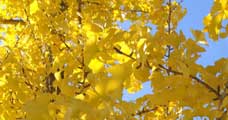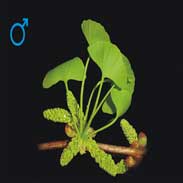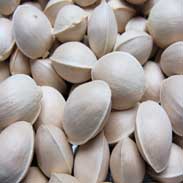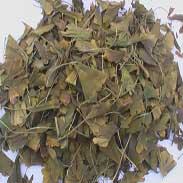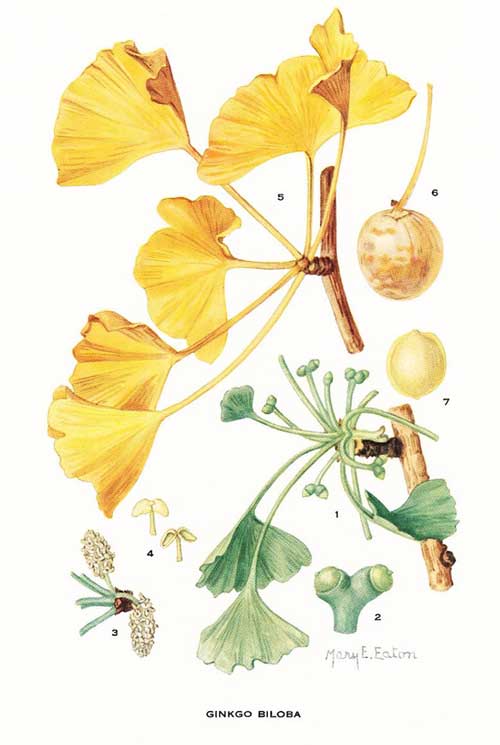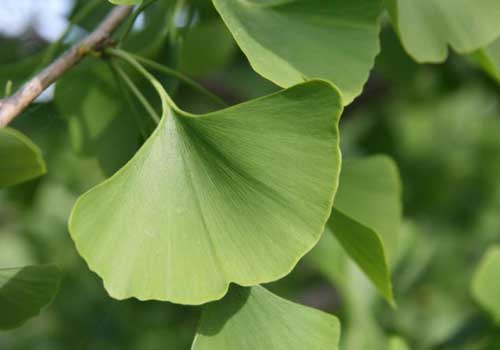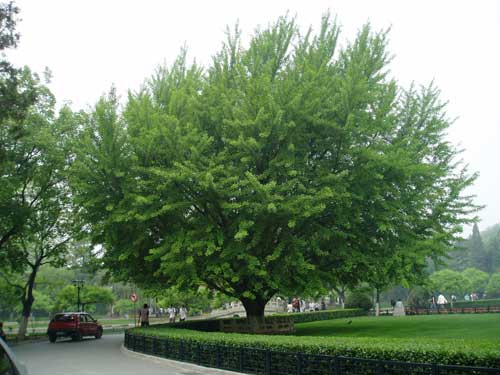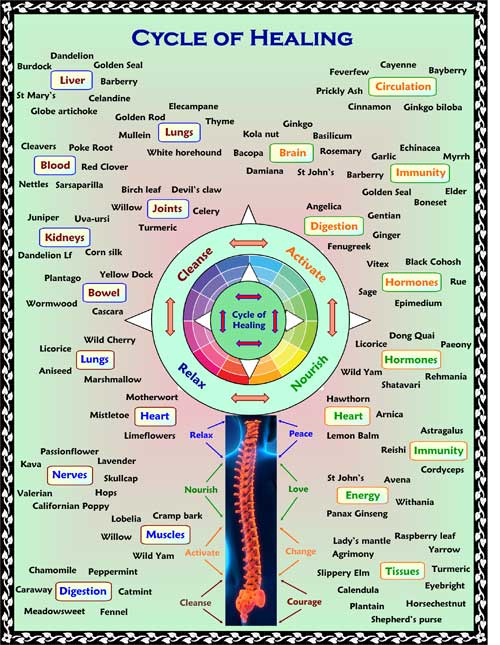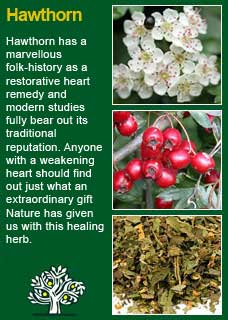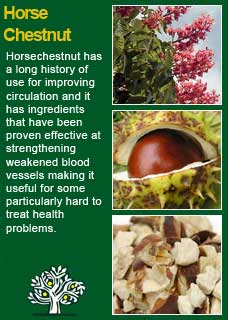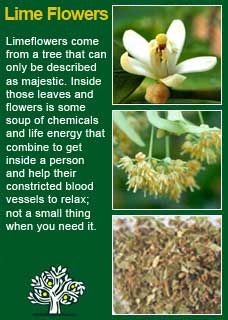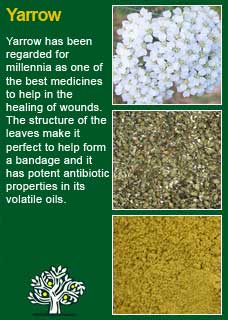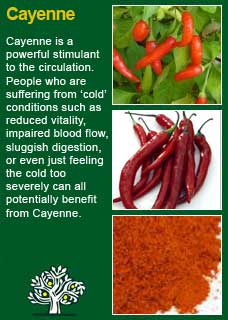
|
|
||||
| Our Pages ABOUT CONSTITUTIONAL MEDICINE
|
Gingko comes from the oldest surviving family of trees on earth - it first grew over 190 million years ago, and its ancestors once thrived in the age of the dinosaurs. A Gingko tree can live as long as a thousand years Ginkgo trees can grow to nearly 40 meters tall and they are often planted in city parks, streets and botanical gardens because of their beauty, long-life and incredible resistance to insects and pollution. In herbal medicine, we use the characteristic 'bi-lobed' fan-shaped leaves of Ginkgo, usually as concentrates.
Ginkgo nuts were used in traditional Chinese medicine for the treatment of respiratory illness such as asthma but there is no recorded historical use of the leaves and this is a marvellous, albeit somewhat rare, example of the medicinal properties of a herb being discovered in modern times by modern science. Some of the main indications for using Ginkgo, based on the evidence, are for: David Hoffmann writes 'Ginkgo's main clinical indication is for the treatment of cerebral insufficiency, a common problem in the elderly. Among the symptoms typical of cerebral insufficiency are difficulties with concentration and memory, absentmindedness, confusion, lack of energy, tiredness, decreased physical performance, depressed mood, and anxiety. Headache, vertigo and tinnitus are other common complaints. These symptoms are associated with impaired cerebral circulation, and are sometimes thought to be early indications of dementia, either the degenerative or the multiple infarct type. However, in some cases, no explanation for the symptoms can be found. Sharol Tilgner writes 'Ginkgo is indicated when the individual has debilitated peripheral circulation to the limbs and head because it increases blood flow to the limbs and brain.
~ With nearly 400 published studies to its credit at last count, Ginkgo biloba is one of the most frequently prescribed herbal medicines in the world today. A large German plant medicine company was the first to develop the standardised concentrate of Ginkgo, involving 27 different steps and requiring 50kgs of herb to produce 1 kg of extract and taking up to two weeks to complete! The majority of the clinical trials on Ginkgo employed a daily dose of 120 to 160 mgs a day which equates to about 6 to 8 grams a day of original dried herb. The 50:1 concentrated extract used in the studies was standardised to contain 22.5% to 25% flavonoid glycosides (ginkgo flavone glycosides) and 6% -8% terpenoids (ginkgolides and bilobalide). Those ginkolides are potent and specific blockers of platelet activating factor (PAF) and their effects are long lived and rapidly established after oral doses. ~ Taking a standardised Ginkgo extract (120mg/day for 4 months) improved mood, sleep, and coping ability for daily activities in a randomised, placebo-controlled study involving 5028 free-living elderly volunteers (Cockle SM, Kimber S, Hindmarch I: Phytomed 7(supp 2):21, 2000) ~ A review of 40 clinical trials conducted from 1975 to 1991 on the clinical use of standardised Ginkgo extracts in patients with cerebral insufficiency and related conditions (primary degenerative dementia, dizziness associated with inner ear disorders, acute cochlear deafness, senile cognitive dementia, and tinnitus) found that all but one of the 40 trials showed positive results - the one inconclusive result was for senile dementia of vascular origin. (van Dongen MC et al: J American Geriatric Society 48(10):1183-1194, 2000) ~ Improvements in cerebral blood flow, motor recovery, intellectual performance, memory, mood, and behaviour were observed in recent stroke victims after treatment with standardised Ginkgo extract in both uncontrolled as well as randomised, double-blind, placebo-controlled and comparative trials. ~ For Alzheimer's disease a meta-analysis of four randomised, double-blind, placebo-controlled trials found a small but significant effect after 3-6 months treatment with 120-240 mg/day of standardised Ginkgo extract on objective measures of cognitive function. A subsequent randomised, double-blind, placebo-controlled multicentre trial in patients with mild to severe Alzheimer's disease or multi-infarct dementia found that, compared with baseline values, treatment with standardised Gingko extract (120 mg/day for 26 weeks) improved daily living and social behaviour and cognitive assessment. The placebo group showed a statistically significant worsening in all domains of assessment. Regarding safety, no differences between Ginkgo and placebo were observed. (Le Bars PL, Kieser M, Itil KZ: Dementia Geriatric Cognitive Discord 1 1(4):230-237, 2000) ~ A meta-analysis found no major difference between standardised Ginkgo extract and four cholinesterase inhibitors (tacrine, donepezil, rivastigmine, and metrifonate) for delaying symptom progression in Alzheimer's disease or response rate compared with placebo. The authors suggested that all treatments compared were equally helpful in treating mild to moderate Alzheimer dementia. (Wettstein A: Phytomed 6(6):393-0401, 2000) ~ There are well over 350 studies and articles published on Ginkgo, a PDF showing their titles, authors and when and where they were published can be found here
For some years now, against this proven and safe way of herbalism, there has been a rising tide of excessive caution and scare-mongering in many parts of the world. The same authorities that, not so long ago, decried herbal medicines as ineffectual, have now taken up a different adversarial position; that they are dangerous substances that should only be prescribed by Doctors, who of course have zero training in them. Unfortunately, the same unnecessary fear and worry has crept into many natural health websites and popular publications on herbs. Herbs that we have safely used for thousands of years, that have no reports of adverse reactions in the medical literature despite widespread use by millions of people, are suddenly described as contraindicated because of something that should have been seen as completely unimportant, or at the utmost a merely theoretical concern, such as a laboratory study on one of the herb's constituents to use an all too common example. I wonder sometimes if the writers of such articles feel that the herb will be more deserving of respect if it is thought to be a little bit dangerous, in other words more like a drug than something that has simply come out of the earth and been used by ordinary people for generations beyond count. There is just so much misinformation about herbal medicine on the internet now. Ludicrous claims and cautions abound in equal measure; it seems like one group are trying to make money out of the public whilst the other are busily trying to scare them off. I have to believe that the kind of reader who takes the time to read pages on herbs that are as extensive as this one is much less likely to be swayed by marketers or misinformers. I hope that you will keep your wits about you if you get conflicting opinions from people who have never really got to know these herbs, who have never worked with them, or learned how to use them safely and effectively. I want to remind you that the reason that herbs can never be patented and owned by any individual or corporation is because they are, and always will be, the People's medicine. They belong to all of us and it is my great hope in sharing this work that you will learn how to use them wisely for yourself, and the people you care for. Be safe, but do not be afraid.
On a very personal level the Ginkgo is a tree that I simply love. Almost every day I go for a walk by the river Avon in Christchurch and at one point, near the end of my outward journey, there is a Ginkgo tree by the water that I often lean right up against and take some moments to just be with it, it has come to feel like an old friend! In 1990, we placed the placentas of our recently born twins; Ben and Danielle, under a new Ginkgo sapling in the yard of a house that backs on to a pine-tree reservation and, from time to time, I still go back there to peer over the fence at how the tree is growing - it's so beautiful! There is good science on Ginkgo and, as you can see from even a glance at some of the snippets from the literature posted above; it's very impressive on paper. Whilst it is not a medicine that is going to make you super-smart or going to give you a better memory than you used to have, if you are aging badly in terms of mental health then you simply must take it; it can make a significant difference. Dosages of Ginkgo do not have to be overly high to achieve its benefits. What is required is an extraction and concentration from about 6-8 grams of the dried herb and this should be quite achievable with approximately two small tablets of good quality extraction of Ginkgo. In most cases, it must be taken for prolonged periods to achieve its best benefits, for a person who have been losing mental faculties from deteriorating blood flow to the brain, it may need to be taken indefinitely. Ginkgo combines perfectly with Hawthorn leaf and berry for many people who need a medicine that is going to help them where they need it the most - their heart and circulation. It can also be very beneficial to use with Horsechestnut, Limeflowers and Yarrow to strengthen blood vessels and can be used with Cayenne to make a more rapid difference to improving the circulation.
Much of the information here about the use of Ginkgo is consistent with the model of thinking whereby one may treat problem A with plant B. There is value in this approach, especially in how it helps us pass on useful knowledge to one another, but it falls short in one vital area; and that is that people are not all cut from the same cloth! Something that works brilliantly for one person may do less for another -- why is this? Part of the reason is that people vary in their constitutions as to whether they are either hotter or cooler and, at the same time, either dryer or damper. This useful and rather fascinating subject is introduced further here Another big part of using the right herb when it is most needed comes from understanding the need to treat what is going wrong for the person that had led up to their getting a health condition. In this light, Ginkgo can particularly offer its benefits when an activation is needed in the 'cycle of healing', more about this here
Please understand that I cannot advise you, including on products or dosage, without seeing you in person in my clinic but for ideas
on how you might find a good herbalist in your area read here |
|
|
© 2011 R.J.Whelan Ltd
